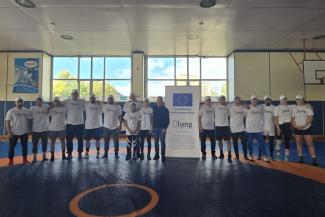UWW adopts Sustainability Charter, reinforces core statements
Thursday, June 29, 2023 - 15:43 By United World Wrestling Press

CORSIER-SUR-VEVEY, Switzerland (June 28) -- United World Wrestling announced the adoption of its Sustainability Charter and new core statements that will guide the organization's future endeavors.
UWW remains committed to its mission of leading the growth of wrestling, competitive and recreational, in all its styles around the world, while striving to be globally recognized as an inspiring, innovative, and leading Olympic federation.
UWW's core statements, including its mission, vision, and values, represent the organization's fundamental beliefs that drive its decisions and actions.
Unity stands at the forefront, as UWW champions respect, belonging, and cooperation among its members. Integrity is paramount, with UWW emphasizing trustworthiness, accountability, and ethical conduct in all aspects of its operations. Finally, resilience fuels UWW's determination to overcome challenges through hard work and discipline, leading to success for the wrestling community.
In line with its dedication to a sustainable future, UWW has introduced its Sustainability Charter. This comprehensive framework is designed to promote sustainable practices, events, and approaches that contribute to wrestling's global development while addressing the world's pressing challenges. The Sustainability Charter encourages UWW and its affiliated national federations to adopt realistic and feasible approaches to support a more sustainable environment.
The principles outlined in UWW's Sustainability Charter encompass a range of sustainability practices within the sport of wrestling. These include initiatives focused on transportation, waste reduction, energy conservation, water preservation, and actions promoting social and economic sustainability.
By fostering awareness of climate and environmental issues, UWW aims to ensure the practice of wrestling for future generations amidst the challenges of climate change, economic crises, and geographic disparities that affect the global wrestling community.
UWW's commitment to sustainability aligns with the United Nations Sustainable Development Goals (SDGs), serving as a catalyst for change in several key areas.
Among these, pursuing the SDG 4: Quality Education, UWW strives to provide access to wrestling through grassroots and school programs while offering continuous education opportunities for coaches, referees, and administrators in close collaboration with national federations and stakeholders.
Under SDG 5: Gender Equality, UWW has integrated gender equality programs into its 2022-2026 Strategy, promoting equal opportunities and representation within the sport.
By adopting the Sustainability Charter and aligning with the SDGs, UWW showcases its dedication to sustainability, ensuring the practice of wrestling for future generations while contributing to a more sustainable world.


Share your thoughts.
Comments